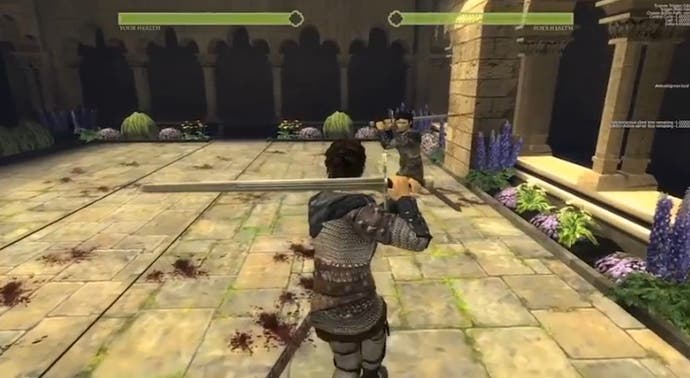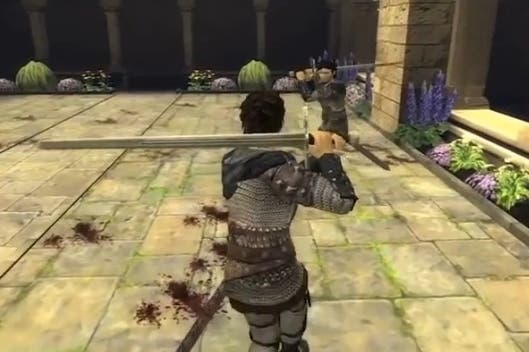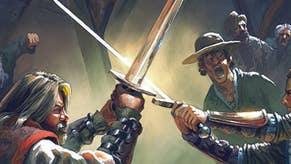Neal Stephenson's swordfighting game Clang has been put on hold indefinitely
After raising a half million dollars on Kickstarter.
Last summer sci-fi author Neal Stephenson took to Kickstarter to pitch a motion-controlled swordfighting game called Clang. It barely reached it's half million dollar goal with $526,125, but now there's been a major hold-up: The developer ran out of money.
As it turns out, the $526K was not meant to fund the entire game, but rather operated as seed money so developer Subutai Corporation could whip up a prototype and gain the attention of larger investors. The problem, as it turns out, was that the money-lending fish weren't biting.
"We simply haven't talked to that many potential investors yet," the Clang team explained in a Kickstarter update. "It is time-consuming and a small number of people can only do so much of it."
The studio hypothesised that the project wasn't getting much attention from the venture capitalist community because people assumed that having a big name like Stephenson on board meant that it was in good standing financially. "They assume we don't actually need the money. This might actually be a variant of the Stephenson fan obfuscation hypothesis. We frequently encounter a sort of wall of incredulity that Stephenson could really be having trouble obtaining funding for a swordfighting game."

Some might say beggars can't be choosers, but Subutai isn't laying down to die just yet, and the studio remains adamant that it doesn't want to rush into anything with an investor who doesn't get the project. "Our only efficient choice is to keep doing what we're doing and wait for the right investor to come along. The right investor for Clang is one who has some pre-existing interest in what we are doing. This might be as simple as a personal fascination with swordfighting or sword games, or something more strategic such as a connection with a hardware-based strategy within the video game industry. Finding people like that takes time, which is one reason we ran out of it."
Despite its current financial status, Subutai doesn't see this as the colossal hurdle other may take it as. "In our opinion, the project doesn't die simply because it runs out of money," the Clang team said. "Projects run out of money all the time. As a matter of fact, game industry veterans we have talked to take a blithe attitude toward running out of money, and seem to consider it an almost obligatory rite of passage."

Beyond simply not finding funding, another reason Clang has been downgraded to a "evenings and weekends" project is due to the fact that its developer couldn't afford to work for free until a brilliant deal came along, so several staffers had to find day jobs to devote most of their time to. "When a couple of promising leads fell through for us in a short span of time circa May, it became obvious to us that our essential people would have to find other ways to keep body and soul together during an upcoming span of time, of indeterminate length, during which the Clang project would be unable to pay them. They chose to find temporary work in the Seattle area, rather than giving up on Clang altogether and seeking permanent jobs."
Subutai also noted that it's been a tough year for games industry publishers all over. "While we have been working on Clang, two major video game publishers, THQ and LucasArts, have gone out of business. Others have fallen on hard times. The current generation of consoles is coming to the end of its life cycle. Rather than invest in innovative new titles, the still-surviving publishers tend to keep their heads down, grinding out sequels and extensions to well-worn AAA franchises."
Though its straits are dire, Subutai is keeping its chin up about the future of Clang. "We feel better about the future of Clang now than we did when the clock was ticking down," the developer said. "Then, we were feeling under pressure to make decisions that might not have been in the project's best long-term interests. Now that the pressure is relieved, however, we can operate more calmly and look for ways to set this thing up in a sustainable way. Meanwhile, the publishing side of Subutai continues to fulfill its obligations and transact business normally."
We've reached out to Subutai to see if it will offer refunds to backers who don't want to wait god-knows-how-long for the project to come to fruition. We're currently awaiting reply and will update as we hear back.







.png?width=291&height=164&fit=crop&quality=80&format=jpg&auto=webp)



